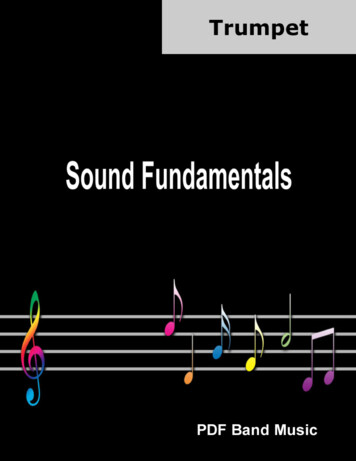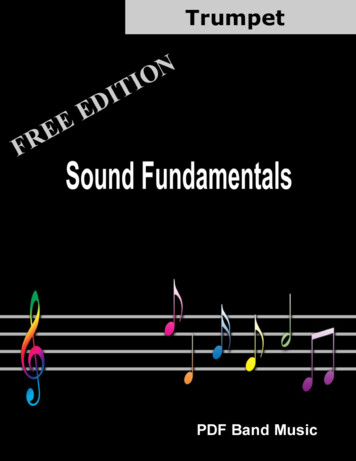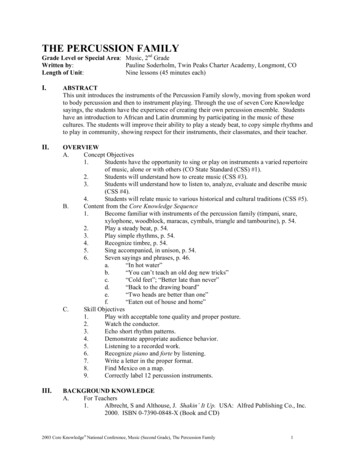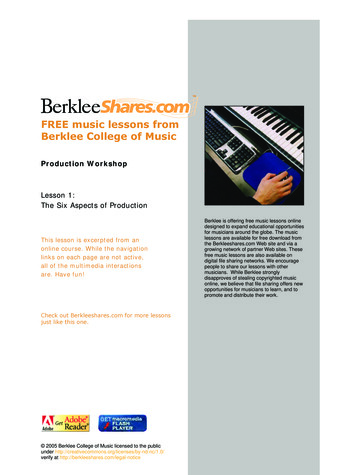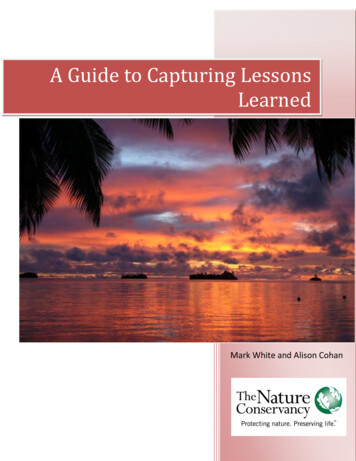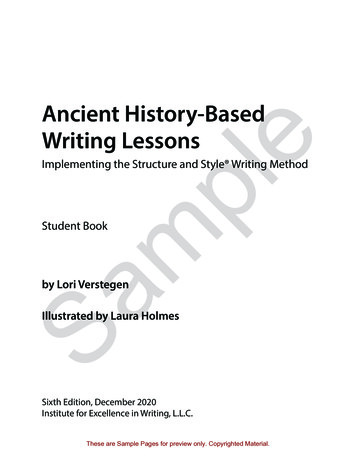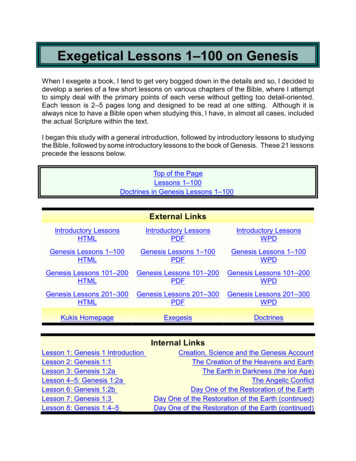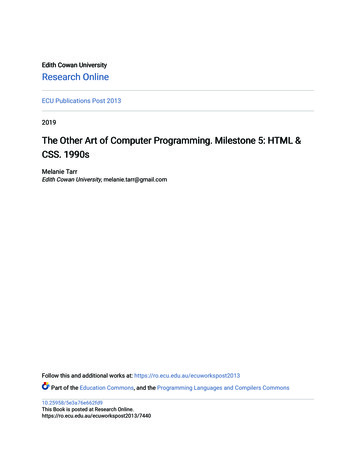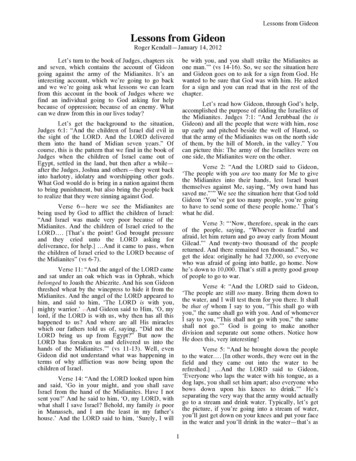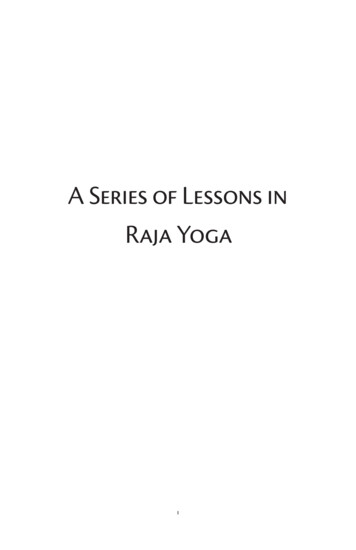
Transcription
A Series of Lessons inRaja Yogai
A Series of Lessons in Raja YogaWritingsThe Hindu‑Yogi Science of BreathHatha Yoga or The Yogi Philosophy of Physical Well‑BeingFourteen Lessons in Yogi Philosophy and Oriental OccultismAdvanced Course in Yogi Philosophy and Oriental OccultismThe Science of Psychic HealingA Series of Lessons in Raja YogaThe Bhagavad Gita or The Message of the MasterThe Spirit of the UpanishadsA Series of Lessons in Gnani YogaA Series of Lessons in Mystic Christianity or The Inner Teachings of the MasterThe Hindu‑Yogi System of Practical Water CureLife Beyond DeathA Series of Lessons on The Inner Teachings of The Philosophies and Religions of Indiaii
A Series of Lessons inRaja Yoga1906Yogi Ramacharaka1862–1932信YOGeBooks: Hollister, MO2016:10:17:14:28iii
A Series of Lessons in Raja YogaCopyrightYOGeBooks by Roger L. Cole, Hollister, MO 65672 2010 YOGeBooks by Roger L. ColeAll rights reserved. Electronic edition published 2010isbn: 978‑1‑61183‑010‑1 (pdf)isbn: 978‑1‑61183‑011‑8 (epub)www.yogebooks.comiv
Epigraph“When the souls sees itself as a Center surrounded by itscircumference—when the Sun knows that it is a Sun, surroundedby its whirling planets—then is it ready for the Wisdom andPower of the Masters.”v
A Series of Lessons in Raja Yogavi
ContentsThe First Lesson. The “I.”The Second Lesson. The Ego’s Mental Tools.The Third Lesson. The Expansion of the Self.The Fourth Lesson. Mental Control.The Fifth Lesson. The Cultivation of Attention.The Sixth Lesson. Cultivation of Perception.The Seventh Lesson. The Unfoldment of Consciousness.The Eighth Lesson. The Highlands and Lowlands of Mind.The Ninth Lesson. The Mental Planes.The Tenth Lesson. Sub‑Consciousing.The Eleventh Lesson. Subconscious Character Building.The Twelfth Lesson. Sub‑Conscious Influences.vii
A Series of Lessons in Raja Yogaviii
Publisher’s NoticeThe lessons which compose this volume, originallyappeared in the shape of monthly lessons, the first ofwhich was issued in October, 1905, and the twelfth inSeptember, 1906. These lessons met with a hearty and generousresponse from the public, and the present volume is issued inresponse to the demand for the lessons in a permanent anddurable form. There have been no changes made in the text.The publishers take the liberty to call the attention of thereader to the great amount of information condensed withinthe space given to each lesson. Students have told us that theyhave found it necessary to read and study each lesson carefully,in order to absorb the varied information contained within itspages. They have also stated that they have found it advisable tore‑read the lessons several times, allowing an interval betweeneach reading and that at each re‑reading they would discoverinformation that had escaped them during the course of theprevious study. This has been repeated to us so often that wefeel justified in mentioning it, that other readers might availthemselves of the same course and plan of study.Following his usual custom, the writer of the lessons hasdeclined to write a preface for this book, claiming that thelessons speak for themselves, and that those for whom theyix
A Series of Lessons in Raja Yogaare intended will receive the message contained within them,without any prefatory talk.The Yogi Publication Society.September 1, 1906.x
A Series of Lessons inRaja Yoga1
A Series of Lessons in Raja Yoga2
The First Lesson.IThe “I.”n India, the Candidates for Initiation into the science of “RajaYoga,” when they apply to the Yogi Masters for instruction, aregiven a series of lessons designed to enlighten them regardingthe nature of the Real Self, and to instruct them in the secretknowledge whereby they may develop the consciousness andrealization of the real “I” within them. They are shown how theymay cast aside the erroneous or imperfect knowledge regardingtheir real identity.Until the Candidate masters this instruction, or at least untilthe truth becomes fixed in his consciousness, further instructionis denied him, for it is held that until he has awakened to aconscious realization of his Actual Identity, he is not able tounderstand the source of his power, and, moreover, is not ableto feel within him the power of the Will, which power underliesthe entire teachings of “Raja Yoga.”The Yogi Masters are not satisfied if the Candidate formsmerely a clear intellectual conception of this Actual Identity,but they insist that he must feel the truth of the same—mustbecome aware of the Real Self—must enter into a consciousnessin which the realization becomes a part of his everyday self—in which the realizing consciousness becomes the prevailing3
A Series of Lessons in Raja Yogaidea in his mind, around which his entire thoughts and actionsrevolve.To some Candidates, this realization comes like a lightningflash the moment the attention is directed toward it, whilein other cases the Candidates find it necessary to follow arigorous course of training before they acquire the realizationin consciousness.The Yogi Masters teach that there are two degrees of thisawakening consciousness of the Real Self. The first, which theycall “the Consciousness of the ‘I’,” is the full consciousness ofreal existence that comes to the Candidate, and which causeshim to know that he is a real entity having a life not dependingupon the body—life that will go on in spite of the destructionof the body—real life, in fact. The second degree, which theycall “the Consciousness of the ‘I am’,” is the consciousness ofone’s identity with the Universal Life, and his relationship to,and “in‑touchness” with all life, expressed and unexpressed.These two degrees of consciousness come in time to all whoseek “The Path.” To some it comes suddenly; to others it dawnsgradually; to many it comes assisted by the exercises andpractical work of “Raja Yoga.”The first lesson of the Yogi Masters to the Candidates,leading up to the first degree, above mentioned, is as follows:That the Supreme Intelligence of the Universe—the Absolute—has manifested the being that we call Man—the highestmanifestation on this planet. The Absolute has manifestedan infinitude of forms of life in the Universe, including distantworlds, suns, planets, etc., many of these forms being unknownto us on this planet, and being impossible of conception by themind of the ordinary man. But these lessons have nothing to dowith that part of the philosophy which deals with these myriadforms of life, for our time will be taken up with the unfoldmentin the mind of man of his true nature and power. Before manattempts to solve the secrets of the Universe without, heshould master the Universe within—the Kingdom of the Self.4
The “I.”When he has accomplished this, then he may, and should, goforth to gain the outer knowledge as a Master demanding itssecrets, rather than as a slave begging for the crumbs from thetable of knowledge. The first knowledge for the Candidate isthe knowledge of the Self.Man, the highest manifestation of the Absolute, as far asthis planet is concerned, is a wonderfully organized being—although the average man understands but little of his realnature. He comprises within his physical, mental and spiritualmake‑up both the highest and the lowest, as we have shown inour previous lessons (the “Fourteen Lessons” and the “AdvancedCourse”). In his bones he manifests almost in the form of minerallife, in fact, in his bones, body and blood mineral substancesactually exist. The physical life of the body resembles the life ofthe plant. Many of the physical desires and emotions are akin tothose of the lower animals, and in the undeveloped man thesedesires and emotions predominate and overpower the highernature, which latter is scarcely in evidence. Then Man has a setof mental characteristics that are his own, and which are notpossessed by the lower animals (See “Fourteen Lessons”). And inaddition to the mental faculties common to all men, or rather,that are in evidence in a greater or lesser degree among all men,there are still higher faculties latent within Man, which whenmanifested and expressed render Man more than ordinaryMan. The unfoldment of these latent faculties is possible to allwho have reached the proper stage of development, and thedesire and hunger of the student for this instruction is causedby the pressure of these unfolding latent faculties, crying to beborn into consciousness. Then there is that wonderful thing,the Will, which is but faintly understood by those ignorantof the Yogi Philosophy—the Power of the Ego—its birthrightfrom the Absolute.But while these mental and physical things belong to Man,they are not the Man himself. Before the Man is able to master,control, and direct the things belonging to him—his tools and5
A Series of Lessons in Raja Yogainstruments—he must awaken to a realization of Himself. Hemust be able to distinguish between the “I” and the “Not I.”And this is the first task before the Candidate.That which is the Real Self of Man is the Divine Spark sentforth from the Sacred Flame. It is the Child of the DivineParent. It is Immortal—Eternal—Indestructible—Invincible. Itpossesses within itself Power, Wisdom, and Reality. But like theinfant that contains within itself the sometime Man, the mindof Man is unaware of its latent and potential qualities, and doesnot know itself. As it awakens and unfolds into the knowledgeof its real nature, it manifests its qualities, and realizes what theAbsolute has given it. When the Real Self begins to awaken, itsets aside from itself those things which are but appendages toit, but which it, in its half‑waking state, had regarded as its Self.Setting aside first this, and then that, it finally discards all of the“Not I,” leaving the Real Self free and delivered from its bondageto its appendages. Then it returns to the discarded appendages,and makes use of them.In considering the question: “What is the Real Self?” let usfirst stop to examine what man usually means when he says “I.”The lower animals do not possess this “I” sense. They areconscious of the outer world; of their own desires and animalcravings and feelings. But their consciousness has not reachedthe Self‑conscious stage. They are not able to think of themselvesas separate entities, and to reflect upon their thoughts. Theyare not possessed of a consciousness of the Divine Spark—theEgo—the Real Self. The Divine Spark is hidden in the lowerforms of life—even in the lower forms of human life—by manysheaths that shut out its light. But, nevertheless, it is there,always. It sleeps within the mind of the savage—then, as heunfolds, it begins to throw out its light. In you, the Candidate,it is fighting hard to have its beams pierce through the materialcoverings. When the Real Self begins to arouse itself from itssleep, its dreams vanish from it, and it begins to see the world6
The “I.”as it is, and to recognize itself in Reality and not as the distortedthing of its dreams.The savage and barbarian are scarcely conscious of the “I.”They are but a little above the animal in point of consciousness,and their “I” is almost entirely a matter of the consciousnessof the wants of the body; the satisfaction of the appetites; thegratification of the passions; the securing of personal comfort;the expression of lust, savage power, etc. In the savage thelower part of the Instinctive Mind is the seat of the “I.” (See“Fourteen Lessons” for explanation of the several mental planesof man.) If the savage could analyze his thoughts he wouldsay that the “I” was the physical body, the said body havingcertain “feelings,” “wants” and “desires.” The “I” of such a manis a physical “I,” the body representing its form and substance.Not only is this true of the savage, but even among so‑called“civilized” men of to‑day we find many in this stage. They havedeveloped powers of thinking and reasoning, but they do not“live in their minds” as do some of their brothers. They use theirthinking powers for the gratification of their bodily desires andcravings, and really live on the plane of the Instinctive Mind.Such a person may speak of “my mind,” or “my soul,” not froma high position where he looks upon these things from thestandpoint of a Master who realizes his Real Self, but frombelow, from the point‑of‑view of the man who lives on theplane of the Instinctive Mind and who sees above himself thehigher attributes. To such people the body is the “I.” Their “I”is bound up with the senses, and that which comes to themthrough the senses. Of course, as Man advances in “culture”and “civilization,” his senses become educated, and are satisfiedonly with more refined things, while the less cultivated manis perfectly satisfied with the more material and gross sensegratifications. Much that we call “cultivation” and “culture”is naught but a cultivation of a more refined form of sensegratification, instead of a real advance in consciousness andunfoldment. It is true that the advanced student and Master7
A Series of Lessons in Raja Yogais possessed of highly developed senses, often far surpassingthose of the ordinary man, but in such cases the senses havebeen cultivated under the mastery of the Will, and are madeservants of the Ego instead of things hindering the progress ofthe soul—they are made servants instead of masters.As Man advances in the scale, he begins to have a somewhathigher conception of the “I.” He begins to use his mind andreason, and he passes on to the Mental Plane—his mind beginsto manifest upon the plane of Intellect. He finds that there issomething within him that is higher than the body. He findsthat his mind seems more real to him than does the physicalpart of him, and in times of deep thought and study he is ablealmost to forget the existence of the body.In this second stage, Man soon becomes perplexed. He findsproblems that demand an answer, but as soon as he thinks hehas answered them the problems present themselves in a newphase, and he is called upon to “explain his explanation.” Themind, even although not controlled and directed by the Will,has a wonderful range, but, nevertheless, Man finds himselftraveling around and around in a circle, and realizes that he isconfronted continually by the Unknown. This disturbs him, andthe higher the stage of “book learning” he attains, the moredisturbed does he become. The man of but little knowledgedoes not see the existence of many problems that forcethemselves before the attention of the man of more knowledge,and demand an explanation from him. The tortures of the manwho has attained the mental growth that enables him to seethe new problems and the impossibility of their answer, cannotbe imagined by one who has not advanced to that stage.The man in this stage of consciousness thinks of his “I” as amental thing, having a lower companion, the body. He feels thathe has advanced, but yet his “I” does not give him the answerto the riddles and questions that perplex him. And he becomesmost unhappy. Such men often develop into Pessimists, andconsider the whole of life as utterly evil and disappointing—a8
The “I.”curse rather than a blessing. Pessimism belongs to this plane,for neither the Physical Plane man or the Spiritual Plane manhave this curse of Pessimism. The former man has no suchdisquieting thoughts, for he is almost entirely absorbed ingratifying his animal nature, while the latter man recognizeshis mind as an instrument of himself, rather than as himself,and knows it to be imperfect in its present stage of growth.He knows that he has in himself the key to all knowledge—locked up in the Ego—and which the trained mind, cultivated,developed and guided by the awakened Will, may grasp as itunfolds. Knowing this the advanced man no longer despairs,and, recognizing his real nature, and his possibilities, as heawakens into a consciousness of his powers and capabilities, helaughs at the old despondent, pessimistic ideas, and discardsthem like a wornout garment. Man on the Mental Plane ofconsciousness is like a huge elephant who knows not his ownstrength. He could break down barriers and assert himself overnearly any condition or environment, but in his ignorance of hisreal condition and power he may be mastered by a puny driver,or frightened by the rustling of a piece of paper.When the Candidate becomes an Initiate—when he passesfrom the purely Mental Plane on to the Spiritual Plane—herealizes that the “I,” the Real Self—is something higher thaneither body or mind, and that both of the latter may be used astools and instruments by the Ego or “I.” This knowledge is notreached by purely intellectual reasoning, although such effortsof the mind are often necessary to help in the unfoldment, andthe Masters so use it. The real knowledge, however, comes as aspecial form of consciousness. The Candidate becomes “aware”of the real “I,” and this consciousness being attained, he passesto the rank of the Initiates. When the Initiate passes the seconddegree of consciousness, and begins to grow into a realizationof his relationship to the Whole—when he begins to manifestthe Expansion of Self—then is he on the road to Mastership.9
A Series of Lessons in Raja YogaIn the present lesson we shall endeavor to point out tothe Candidate the methods of developing or increasingthe realization of this “I” consciousness—this first degreework. We give the following exercises or development drillsfor the Candidate to practice. He will find that a careful andconscientious following of these directions will tend to unfoldin him a sufficient degree of the “I” consciousness, to enable himto enter into higher stages of development and power. All thatis necessary is for the Candidate to feel within himself the dawnof the awakening consciousness, or awareness of the Real Self.The higher stages of the “I” consciousness come gradually, foronce on the Path there is no retrogression or going backward.There may be pauses on the journey, but there is no such thingas actually losing that which is once gained on The Path.This “I” consciousness, even in its highest stages, is but apreliminary step toward what is called “Illumination,” andwhich signifies the awakening of the Initiate to a realizationof his actual connection with and relation to the Whole. Thefull sight of the glory of the “I,” is but a faint reflected glow of“Illumination.” The Candidate, once that he enters fully into the“I” consciousness, becomes an “Initiate.” And the Initiate whoenters into the dawn of Illumination takes his first step uponthe road to Mastery. The Initiation is the awakening of the soulto a knowledge of its real existence—the Illumination is therevelation of the real nature of the soul, and of its relationshipwith the Whole. After the first dawn of the “I” consciousnesshas been attained, the Candidate is more able to grasp themeans of developing the consciousness to a still higher degree—is more able to use the powers latent within him; to controlhis own mental states; to manifest a Centre of Consciousnessand Influence that will radiate into the outer world which isalways striving and hunting for such centres around which itmay revolve.Man must master himself before he can hope to exert aninfluence beyond himself. There is no royal road to unfoldment10
The “I.”and power—each step must be taken in turn, and eachCandidate must take the step himself, and by his own effort. Buthe may, and will, be aided by the helping hand of the teacherswho have traveled The Path before him, and who know justwhen that helping hand is needed to lift the Candidate overthe rough places.We bid the Candidate to pay strict attention to the followinginstruction, as it is all important. Do not slight any part of it,for we are giving you only what is necessary, and are stating itas briefly as possible. Pay attention, and follow the instructionclosely. This lesson must be mastered before you progress. Andit must be practiced not only now, but at many stages of thejourney, until full Initiation and Illumination is yours.Rules And Exercises Designed To Aid The Candidate In HisInitiation.The first instruction along the line of Initiation is designedto awaken the mind to a full realization and consciousness ofthe individuality of the “I.” The Candidate is taught to relax hisbody, and to calm his mind and to meditate upon the “I” untilit is presented clearly and sharply before the consciousness. Weherewith give directions for producing the desired physical andmental condition, in which meditation and concentration aremore readily practiced. This state of Meditation will be referredto in subsequent exercises, so the Candidate is advised toacquaint himself thoroughly with it.State Of Meditation. If possible, retire to a quiet place orroom, where you do not fear interruption, so that your mindmay feel secure and at rest. Of course, the ideal conditioncannot always be obtained, in which case you must do thebest you can. The idea is that you should be able to abstractyourself, so far as is possible, from distracting impressions, andyou should be alone with yourself—in communion with yourReal Self.11
A Series of Lessons in Raja YogaIt is well to place yourself in an easy chair, or on a couch, so thatyou may relax the muscles and free the tension of your nerves.You should be able to “let go” all over, allowing every muscleto become limp, until a feeling of perfect peace and restfulcalm permeates every particle of your being. Rest the body andcalm the mind. This condition is best in the earlier stages of thepractice, although after the Candidate has acquired a degreeof mastery he will be able to obtain the physical relaxation andmental calm whenever and wherever he desires.But he must guard against acquiring a “dreamy” way of goingaround, wrapped in meditation when he should be attending tothe affairs of life. Remember this, the State of Meditation shouldbe entirely under the control of the Will, and should be enteredinto only deliberately and at the proper times. The Will mustbe master of this, as well as of every other mental state. TheInitiates are not “day dreamers,” but men and women having fullcontrol of themselves and their moods. The “I” consciousnesswhile developed by meditation and consciousness, soonbecomes a fixed item of consciousness, and does not have tobe produced by meditation. In time of trial, doubt, or trouble,the consciousness may be brightened by an effort of the Will(as we shall explain in subsequent lessons) without going intothe State of Meditation.The Realization Of The “I.” The Candidate must firstacquaint himself with the reality of the “I,” before he will be ableto learn its real nature. This is the first step. Let the Candidateplace himself in the State of Meditation, as heretoforedescribed. Then let him concentrate his entire attention uponhis Individual Self, shutting out all thought of the outside world,and other persons. Let him form in his mind the idea of himselfas a real thing—an actual being—an individual entity—a Sunaround which revolves the world. He must see himself as theCentre around which the whole world revolves. Let not afalse modesty, or sense of depreciation interfere with this idea,for you are not denying the right of others to also consider12
The “I.”themselves centres. You are, in fact, a centre of consciousness—made so by the Absolute—and you are awakening to the fact.Until the Ego recognizes itself as a Centre of Thought, Influenceand Power, it will not be able to manifest these qualities. Andin proportion as it recognizes its position as a centre, so willit be able to manifest its qualities. It is not necessary that youshould compare yourself with others, or imagine yourselfgreater or higher than them. In fact, such comparisons are tobe regretted, and are unworthy of the advanced Ego, being amark and indication of a lack of development, rather than thereverse. In the Meditation simply ignore all consideration ofthe respective qualities of others, and endeavor to realize thefact that you are a great Centre of Consciousness—a Centreof Power—a Centre of Influence—a Centre of Thought. Andthat like the planets circling around the sun, so does your worldrevolve around you who are its centre.It will not be necessary for you to argue out this matter,or to convince yourself of its truth by intellectual reasoning.The knowledge does not come in that way. It comes in theshape of a realization of the truth gradually dawning uponyour consciousness through meditation and concentration.Carry this thought of yourself as a “Centre of Consciousness—Influence—Power” with you, for it is an occult truth, and in theproportion that you are able to realize it so will be your abilityto manifest the qualities named.No matter how humble may be your position—no matterhow hard may be your lot—no matter how deficient ineducational advantages you may be—still you would notchange your “I” with the most fortunate, wisest and highestman or woman in the world. You may doubt this, but thinkfor a moment and you will see that we are right. When you saythat you “would like to be” this person or that, you really meanthat you would like to have their degree of intelligence, power,wealth, position, or what not. What you want is somethingthat is theirs, or something akin to it. But you would not for a13
A Series of Lessons in Raja Yogamoment wish to merge your identity with theirs, or to exchangeselves. Think of this for a moment. To be the other person youwould have to let yourself die, and instead of yourself youwould be the other person. The real you would be wiped outof existence, and you would not be you at all, but would be he.If you can but grasp this idea you will see that not for amoment would you be willing for such an exchange. Of coursesuch an exchange is impossible. The “I” of you cannot be wipedout. It is eternal, and will go on, and on, and on, to higher andhigher states—but it always will be the same “I.” Just as you,although a far different sort of person from your childhood self,still you recognize that the same “I” is there, and always hasbeen there. And although you will attain knowledge, experience,power and wisdom in the coming years, the same “I” will bethere. The “I” is the Divine Spark and cannot be extinguished.The majority of people in the present stage of the racedevelopment have but a faint conception of the reality of the “I.”They accept the statement of its existence, and are conscious ofthemselves as an eating, sleeping, living creature—somethinglike a higher form of animal. But they have not awakened to an“awareness” or realization of the “I,” which must come to all whobecome real centres of Influence and Power. Some men havestumbled into this consciousness, or a degree of it, withoutunderstanding the matter. They have “felt” the truth of it, andthey have stepped out from the ranks of the commonplacepeople of the world, and have become powers for good or bad.This is unfortunate to some extent, as this “awareness” withoutthe knowledge that should accompany it may bring pain to theindividual and others.The Candidate must meditate upon the “I,” and recognize it—feel it—to be a Centre. This is his first task. Impress upon yourmind the word “I,” in this sense and understanding, and let itsink deep down into your consciousness, so that it will becomea part of you. And when you say “I,” you must accompany theword with the picture of your Ego as a Centre of Consciousness,14
The “I.”and Thought, and Power, and Influence. See yourself thus,surrounded by your world. Wherever you go, there goes theCentre of your world. You are the Centre, and all outside of yourevolves around that Centre. This is the first great lesson on theroad to Initiation. Learn it!The Yogi Masters teach the Candidates that their realizationof the “I” as a Centre may be hastened by going into theSilence, or State of Meditation, and repeating their first nameover slowly, deliberately and solemnly a number of times. Thisexercise tends to cause the mind to centre upon the “I,” andmany cases of dawning Initiation have resulted from thispractice. Many original thinkers have stumbled upon thismethod, without having been taught it. A noted exampleis that of Lord Tennyson, who has written that he attained adegree of Initiation in this way. He would repeat his own name,over and over, and the same time meditating upon his identity,and he reports that he would become conscious and “aware” ofhis reality and immortality—in short would recognize himselfas a real center of consciousness.We think we have given you the key to the first stage ofmeditation and concentration. Before passing on, let us quotefrom one of the old Hindu Masters. He says, regarding thismatter: “When the soul sees itself as a Centre surrounded byits circumference—when the Sun knows that it is a Sun, andis surrounded by its whirling planets—then is it ready for theWisdom and Power of the Masters.”The Knowledge Of The Independence Of The “I” From TheBody. Many of the Candidates find themselves prevented froma full realization of the “I” (even after they have begun to graspit) by the confusing of the reality of the “I” with the sense of thephysical body. This is a stumbling block that is easily overcomeby meditation and concentration, the independence of the “I”often becoming manifest to the Candidate in a flash, upon theproper thought being used as the subject of meditation.15
A Series of Lessons in Raja YogaThe exercise is given as follows: Place yourself in the Stateof Meditation, and think of yourself—the Real “I”—as beingindependent of the body, but using the body as a coveringand an instrument. Think of the body as you might of a suit ofclothes. Realize that you are able to leave the body, and still bethe same “I.” Picture yourself as doing this, and
A Series of Lessons in Raja Yoga ii Writings The Hindu‑Yogi Science of Breath . isbn: 978‑1‑61183‑010‑1 (pdf) isbn: 978‑1‑61183‑011‑8 (epub) www.yogebooks.com. v Epigraph . declined to write a preface for this book, claiming that the les
